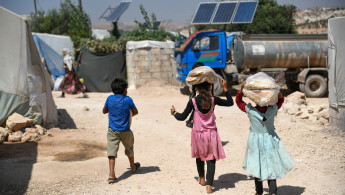TikTok takes 'up to 70%' of money displaced Syrians make from appeals on livestreams: report
Displaced Syrians are taking to TikTok to appeal for funds and are seeing a huge slice of the money they make taken by the social media giant, a BBC investigation has found.
In northwest Syria, where hundreds of thousands of Syrians live in poverty in tents and other temporary accommodations, children plead - sometimes for hours at a time - for virtual gifts that can be withdrawn from the app as cash.
Livestreams earn up to $1,000 an hour, but TikTok takes up to 70% percent of the money made, the joint investigation by the BBC’s Global Disinformation Team, BBC News Arabic, and BBC Eye found.
TikTok told the British broadcaster it took significantly less than a 70% slice of the proceeds, but declined to confirm the exact amount.
Agencies contracted by TikTok to bring live streamers to the platform also take a cut of the donations, leaving impoverished families with only a tiny slice of the funds they raised.
War has raged in Syria since 2011, after President Bashar al-Assad's regime brutally cracked down on pro-democracy protesters.
More than 11 million people have fled their homes since 2011; over half of them are displaced within Syria.
Poverty is rife nationwide, with little in the way of employment opportunities for Syrians who remain in the country - leaving some with little other option but to plead for money online.
Marwa Fatafta, MENA policy manager for digital rights organisation Access Now, told the BBC that though people have the right to share their stories online "to try to seek support and sympathy", these livestreams "lack dignity, and are humiliating".
She said the livestreams run contrary to TikTok's own policies to "prevent the harm, endangerment or exploitation" of minors on the platform.
TikTok said of the BBC's findings: "We are deeply concerned by the information and allegations brought to us by the BBC, and have taken prompt and rigorous action.
The social media giant said it would take prompt action against "exploitative begging" and that this type of content was not allowed on its platform.
"This type of content is not allowed on our platform, and we are further strengthening our global policies around exploitative begging."





 Follow the Middle East's top stories in English at The New Arab on Google News
Follow the Middle East's top stories in English at The New Arab on Google News
![The UAE is widely suspected of arming the RSF militia [Getty]](/sites/default/files/styles/image_330x185/public/2024-11/GettyImages-472529908.jpg?h=69f2b9d0&itok=Yauw3YTG)
![Netanyahu furiously denounced the ICC [Getty]](/sites/default/files/styles/image_330x185/public/2024-11/GettyImages-2169352575.jpg?h=199d8c1f&itok=-vRiruf5)
![Both Hamas and the Palestinian Authority welcomed the ICC arrest warrants [Getty]](/sites/default/files/styles/image_330x185/public/2024-11/GettyImages-2178351173.jpg?h=199d8c1f&itok=TV858iVg)